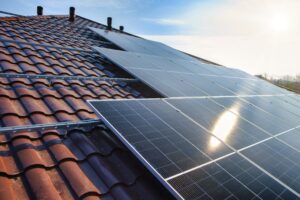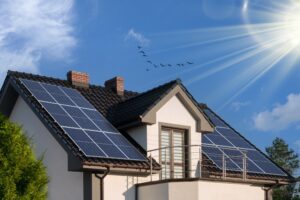Solar panels are becoming increasingly popular as an eco-friendly way to generate free electricity and help households reduce electricity bills and carbon emissions. When paired with a smart meter, this can result in greater savings.
Smart meters help households track and manage energy consumption more effectively. Here we explain all you need to know about smart meters and how they can be a useful addition together with solar panels.
Smart Meters
Smart meters are effectively the electronic version of electricity and gas meters.They’ve been around for more than a decade, providing households with comprehensive information about their energy use, making it easier to monitor energy consumption.
With old meters, you have to take your own readings and submit them to your supplier. Smart meters not only measure how much energy you use but also send readings to your supplier via a remote connection. This means your bills are more accurate and there is no need to rely on estimated bills or provide your own monthly readings.
Smart meters also come with a portable in-home display (IHD). This near real-time data allows you to track your energy use at a glance, which can help reduce consumption and bills. Some smart meters can also provide data on apps or online platforms.
In itself, a smart meter won’t automatically save you money, but it can give you a better insight into how to lower your energy bills, and cheaper tariffs may be available.
Solar Panels
Solar photovoltaic (PV) panels power homes with free, renewable energy from the sun.Solar cells in the panels generate electricity from photons – small pockets of energy in sunlight. An inverter then converts this direct current (DC) into the alternating current (AC) used in household electrical circuits.
Various types of solar panels have been developed. The most commonly used for homes are monocrystalline solar panels because they’re most efficient at converting sunlight into energy.
Solar PV panels cost on average around £7,000 to install. Government grants towards the cost are available in some circumstances to ease fuel poverty among households on low income.
Solar arrays can cut energy bills by up to 70% – more if the system incorporates solar battery storage.
And you can earn money by selling surplus solar-generated electricity back to the national grid through the Smart Export Guarantee. (More on this later).
Solar panels last 25 to 30 years with basic maintenance. They typically start paying for themselves within 10 years or sooner.
More than 1.3 million UK homes now have solar panels. The number of installations in 2023 was a 12-year high – a 30% increase on the previous year.
Unlike carbon fuels – coal, natural gas, and oil – solar power combats climate change. Solar panels leave a minimal carbon footprint and emit no greenhouse gases.
- Create a Tailored Quote Based On Your Circumstances
- Takes Less Than 2 Minutes
- Fixed-Online Quotes

Smart Meters for Solar Panels
You can have a smart meter installed for free at the same time as your solar panels or anytime afterwards. Without a smart meter, you’d need to install a separate export meter and these can be less accurate and affect payments for excess energy your system produces.
Both first-generation smart meters and second-generation smart meters are compatible with solar panel systems, though the second generation offers more accuracy and superior functionality, maximising the potential benefits of solar technology.
Smart meters are being installed nationwide in a government initiative in conjunction with energy suppliers. The aim is to offer every household a smart meter to reduce the country’s carbon footprint.
Many – but not all – energy companies have so far configured their smart meter systems to track energy exported to the grid by solar panels. These include Octopus, British Gas, Utilita, EDF Energy, First Utility, and Ovo Energy.
You don’t have to pay for a smart meter. There is no upfront charge for installation because energy companies recoup installation costs through energy bills over time.
Smart meters are scheduled to be offered to every home in the UK by the end of 2025 as part of the drive towards the net zero carbon goal. They’re part of the effort to establish a smart energy grid to provide low-carbon energy to households.
However, smart meters aren’t compulsory. You’re under no obligation to have one installed in your home, whether you have solar panels or not.
First-Generation and Second-Generation Smart Meters
The energy industry uses the term Smart Metering Equipment Technical Specification (SMETS) to refer to smart meters.
Installation of the first generation of smart meters – SMETS1 – started in 2013. Most of these meters used a 3G mobile network which made them prone to temporarily losing smart functionality when switched between energy companies. If you changed energy supplier, your meter could stop sending automatic readings to the new supplier, who had to ask for manual readings.
The current industry standard of smart meters – SMETS2 – was launched in 2018. These meters are fully compatible with the national network they use to communicate with suppliers. If you switch supplier, you won’t lose smart meter functionality.
SMETS2 technology works better because it connects to a dedicated communications network run by the Data and Communications Company (DCC). The DCC sends and receives data via a wide area network (WAN) designed to work for all energy suppliers. This is a closed network, accessible only with security keys.
Communications between the DCC and smart meters can vary in different areas. In some cases, the meters communicate directly with the DCC. In other areas, a smart meter will exchange data with other smart meters until it finds one directly linked to the wide area network.
Smart Meter Rollout
The government originally planned to complete its smart meter rollout programme by 2019, but technical issues with the meters resulted in the deadline being pushed back six years. Some of these problems were experienced by households using smart meters with solar panels.
Most of the technical issues with first-generation smart meters have now been resolved with the rollout of SMETS2 meters. This means there’s far less risk of a new smart meter going dumb if you change energy provider. However, fluctuating mobile signal in some areas could be an issue.
The government aims to switch first-generation smart meters to the new wide area network so they can regain smart functions.
How Smart Meters Work with Solar Panels
Solar panel systems work with all types of meters, including smart meters.Smart meters and solar panels can blend together seamlessly, providing a highly- efficient energy system with significant environmental and financial benefits.
Smart meters allow you to see exactly how much solar energy you’re using, how much you’re importing from the national grid, and how much you’re exporting back to the grid.
They show you near real-time data on solar power generation and energy consumption. This facilitates better household energy management and helps optimise the benefits of solar panels.
The greater insight into energy patterns informs better decisions on energy-efficient practices to reduce carbon footprint and save money on electricity bills.
Unlike old meters, smart meters record and display solar energy export and import separately. They incorporate an export metering feature that distinguishes between energy that’s used by your home straight away, energy sent back to the grid, and energy sold back to the grid.
Benefits of Smart Meters for Solar
As demand for solar energy continues to increase, so does the need for technology to effectively monitor use of the electricity it provides.
When you have precise information from a smart meter about your household electricity consumption, it’s easier to understand your energy use patterns – how much energy you’re using at different times – and how much it’s costing you.
This near real-time data enables you to make informed decisions and adopt more energy-efficient practices that further reduce carbon footprint and save more money on fuel bills.You may, of instance, decide to make a point of running energy-intensive appliances during peak solar generation hours.
Further reducing reliance on grid-supplied electricity in this way not only lowers energy bills but also lessens environmental impact by easing demand for non-renewable energy.
While both generations of smart meters can work with solar panels, second-generation meters offer greater accuracy and functionality. This maximises the potential environmental and financial advantages of solar energy.
Furthermore, the remote monitoring feature of smart meters reduces the chances of inaccurate estimated bills, so you know you’re only paying for the grid electricity you’ve used. And you won’t have the worry of being underpaid for electricity you sell back to the grid.
Smart meters are also useful in the early detection of any technical issues with your solar panels, allowing for prompt action to avoid further problems and more costly maintenance.
Smart Meters and the Smart Export Guarantee
Solar panels work optimally in daylight, when many households use less electricity. They provide little or no power during the evenings, when energy use typically increases.
A decent amount of energy generated by solar panels isn’t generally used immediately but can be directed back to the national grid for someone else to use. There’s a way to get paid for this surplus energy, though. You can sell it back to the national grid under the government-backed Smart Export Guarantee (SEG) with. A fixed amount for each unit of electricity exported back to the grid.
Ready to Get Smart?
Going solar is a smart move for homeowners, and so is using a smart meter.A smart meter enables you to monitor your home’s solar and grid electricity consumption and adapt your energy use accordingly to optimise the advantages of solar panels.
Smart meters end the inconvenience of manual meter readings and the need for estimated bills, and the near real time information allows you to control your household energy consumption more efficiently.
Contact us if you’d like to know more about the benefits of smart meter solar panels.
- Create a Tailored Quote Based On Your Circumstances
- Takes Less Than 2 Minutes
- Fixed-Online Quotes




